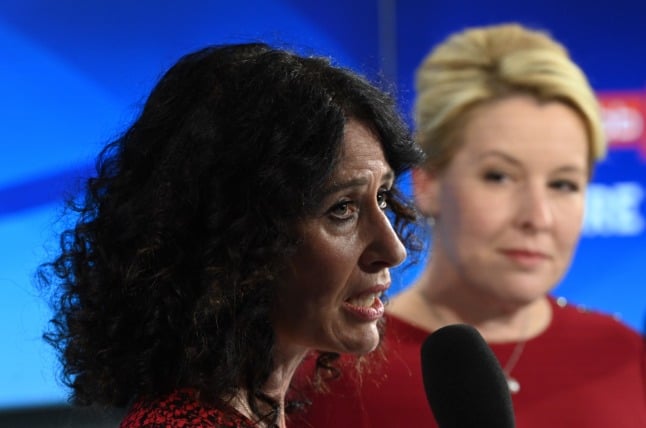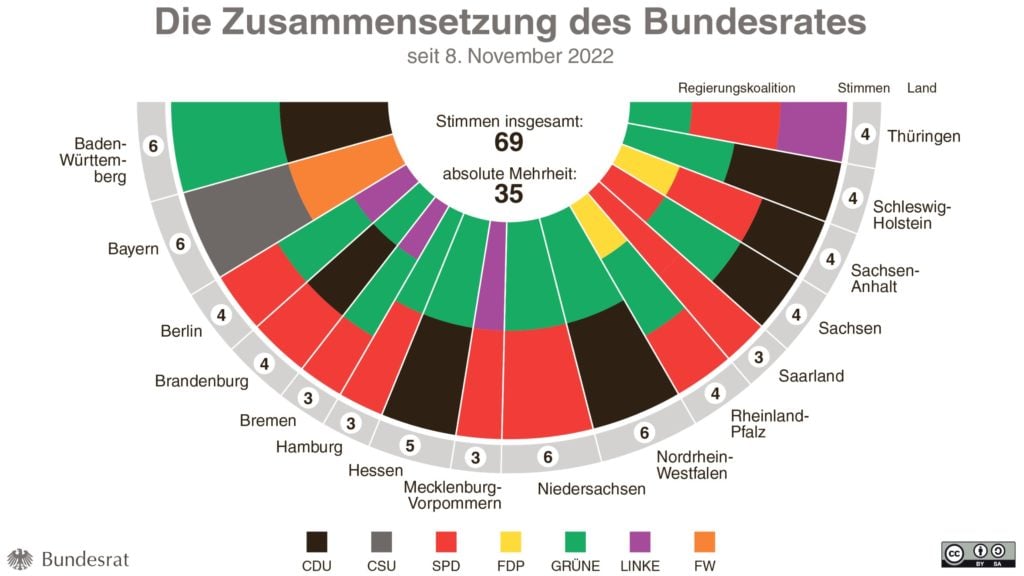How the German government will be tested in 2023 with four state elections

Bavaria, Hesse, Bremen, and Berlin are all set to have state parliament elections this year – with the capital having to repeat the one it ran barely a year ago. What does that mean for the federal traffic light coalition’s agenda?
Although they’re not facing a federal vote until 2025, Germany’s government will be tested several times this year. Four of the country’s 16 federal states will vote in 2023.
Campaigning and voting has already started in Berlin, ahead of February 12th's Wiederholungswahl – or “repeat vote.” Berliners will be voting again for the same choices of candidates, after the state constitutional court declared the 2021 Berlin vote invalid due to logistical snafus with Berlin Marathon roadblocks preventing ballots from reaching polling stations.
As the year rolls on, we’ll see Bremen vote on May 14th and Bavaria on October 8th. Hesse will vote sometime in autumn but the exact date isn’t clear yet.
READ ALSO: EXPLAINED: Why Berlin could vote again after 2021 election disaster
Federal politicians like Chancellor Olaf Scholz will keep their eye on state elections for two main reasons. The first is that it’s a litmus test for how popular each of the parties are doing. The second is that each state election may theoretically end up changing the composition of the Bundesrat – Germany’s upper chamber that represents the states. Depending on the law being considered, that can sometimes make it harder for the federal government to pass laws.
State elections as a popularity contest
The party most concerned about state election results is likely to be the liberal Free Democrats (FDP). Their poll ratings have had the biggest drop of the three governing parties since taking office and state-level votes could end up confirming this. Scholz’s Social Democrats (SPD) have also lost popularity, but to a slightly lesser extent.
“If the liberals’ negative trend continues in the 2023 elections, it will shake the coalition federally,” Uwe Jun, a Professor of Political Science at the University of Trier, told the Tagesspiegel newspaper.
 The Greens' Bettina Jarasch und the SPD's Franziska Giffey are facing off for the Mayor's office in Berlin's repeat election this February. Photo: picture alliance/dpa/dpa-Zentralbild/POOL | Soeren Stache
The Greens' Bettina Jarasch und the SPD's Franziska Giffey are facing off for the Mayor's office in Berlin's repeat election this February. Photo: picture alliance/dpa/dpa-Zentralbild/POOL | Soeren Stache
Meanwhile, the Greens and conservative Christian Democrats have enjoyed rises in popularity and may well be looking forward to state results. In Berlin, polls are close enough between current SPD Mayor Franziska Giffey, Green candidate Bettina Jarasch, and CDU leader Kai Wegner that the Mayor’s office may well change hands. At 25 percent in the polls, there’s even the possibility the conservatives could take the Berlin Mayor’s office for the first time in over 20 years.
State elections and the Bundesrat
When a new state government is elected, it sends new representatives to Germany’s upper chamber – the Bundesrat. Since laws in Germany have to pass both the Bundestag and the Bundesrat, a German Chancellor will always have his or her eye on their Bundesrat majority. As each year usually sees a handful of state elections, each year tends to offer several chances for the Bundesrat’s makeup of delegates to change.

The current party composition of Germany's upper legislative chamber, the Bundesrat, which represents state governments. A citizenship reform bill must pass both the Bundestag and Bundesrat. But a Bundesrat veto will be hard to achieve and its composition is unlikely to change much in 2023. Image: Bundesrat
The current polls though, suggest the Bundesrat’s makeup is unlikely to change very much. Both Bavaria’s and Bremen’s state governments are on track to be comfortably re-elected – something that might well happen in Berlin too. In Hesse, either the Greens or SPD look likely to take state leadership from the conservative CDU. That’ll make it even easier for Olaf Scholz to pass traffic light coalition legislation federally.
READ ALSO: EXPLAINED: Could Germany’s conservatives block dual citizenship?
Certain landmark legislation, such as the federal government’s citizenship reform bill - which will allow dual citizenship and shorten the time someone needs to be resident in Germany before naturalising – is also likely to pass in summer. That’ll be after Berlin and Bremen have voted but before Bavaria and Hesse, meaning that not enough seats could even theoretically change hands in the Bundesrat to block the bill before it passes.
Comments
See Also
Although they’re not facing a federal vote until 2025, Germany’s government will be tested several times this year. Four of the country’s 16 federal states will vote in 2023.
Campaigning and voting has already started in Berlin, ahead of February 12th's Wiederholungswahl – or “repeat vote.” Berliners will be voting again for the same choices of candidates, after the state constitutional court declared the 2021 Berlin vote invalid due to logistical snafus with Berlin Marathon roadblocks preventing ballots from reaching polling stations.
As the year rolls on, we’ll see Bremen vote on May 14th and Bavaria on October 8th. Hesse will vote sometime in autumn but the exact date isn’t clear yet.
READ ALSO: EXPLAINED: Why Berlin could vote again after 2021 election disaster
Federal politicians like Chancellor Olaf Scholz will keep their eye on state elections for two main reasons. The first is that it’s a litmus test for how popular each of the parties are doing. The second is that each state election may theoretically end up changing the composition of the Bundesrat – Germany’s upper chamber that represents the states. Depending on the law being considered, that can sometimes make it harder for the federal government to pass laws.
State elections as a popularity contest
The party most concerned about state election results is likely to be the liberal Free Democrats (FDP). Their poll ratings have had the biggest drop of the three governing parties since taking office and state-level votes could end up confirming this. Scholz’s Social Democrats (SPD) have also lost popularity, but to a slightly lesser extent.
“If the liberals’ negative trend continues in the 2023 elections, it will shake the coalition federally,” Uwe Jun, a Professor of Political Science at the University of Trier, told the Tagesspiegel newspaper.

Meanwhile, the Greens and conservative Christian Democrats have enjoyed rises in popularity and may well be looking forward to state results. In Berlin, polls are close enough between current SPD Mayor Franziska Giffey, Green candidate Bettina Jarasch, and CDU leader Kai Wegner that the Mayor’s office may well change hands. At 25 percent in the polls, there’s even the possibility the conservatives could take the Berlin Mayor’s office for the first time in over 20 years.
State elections and the Bundesrat
When a new state government is elected, it sends new representatives to Germany’s upper chamber – the Bundesrat. Since laws in Germany have to pass both the Bundestag and the Bundesrat, a German Chancellor will always have his or her eye on their Bundesrat majority. As each year usually sees a handful of state elections, each year tends to offer several chances for the Bundesrat’s makeup of delegates to change.

The current polls though, suggest the Bundesrat’s makeup is unlikely to change very much. Both Bavaria’s and Bremen’s state governments are on track to be comfortably re-elected – something that might well happen in Berlin too. In Hesse, either the Greens or SPD look likely to take state leadership from the conservative CDU. That’ll make it even easier for Olaf Scholz to pass traffic light coalition legislation federally.
READ ALSO: EXPLAINED: Could Germany’s conservatives block dual citizenship?
Certain landmark legislation, such as the federal government’s citizenship reform bill - which will allow dual citizenship and shorten the time someone needs to be resident in Germany before naturalising – is also likely to pass in summer. That’ll be after Berlin and Bremen have voted but before Bavaria and Hesse, meaning that not enough seats could even theoretically change hands in the Bundesrat to block the bill before it passes.
Join the conversation in our comments section below. Share your own views and experience and if you have a question or suggestion for our journalists then email us at [email protected].
Please keep comments civil, constructive and on topic – and make sure to read our terms of use before getting involved.
Please log in here to leave a comment.